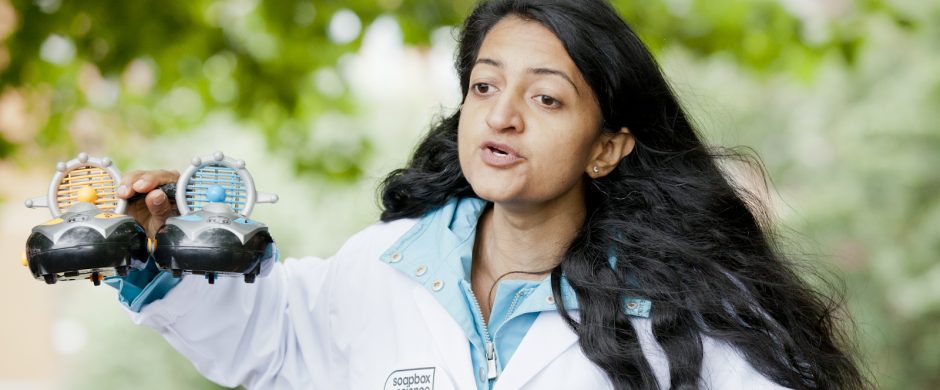 Carolyn Moores is Professor of Structural Biology at Birkbeck University of London. She investigates the cytoskeletons of cells using electron microscopy. You can catch Carolyn on her soapbox on the 27th of May in London, where she’ll give a talk called: “Size matters: studying the nanomachinery in our cells that keeps us alive”
Carolyn Moores is Professor of Structural Biology at Birkbeck University of London. She investigates the cytoskeletons of cells using electron microscopy. You can catch Carolyn on her soapbox on the 27th of May in London, where she’ll give a talk called: “Size matters: studying the nanomachinery in our cells that keeps us alive”
SS: How did you get to your current position?
CM: I studied undergraduate Biochemistry and Structural Biology as a PhD student. After postdoctoral research in sunny San Diego, I returned to the UK to start my own research team at Birkbeck College, London, where I’ve been ever since.
Our work focuses on the cytoskeleton. In the same way as our bodies have a skeleton that provides support and strength, the cells in our bodies have a skeleton – called the cytoskeleton – which also gives them support and strength. The cytoskeleton makes many important contributions to our health, and its malfunction is associated with numerous diseases including neurodegeneration and cancer. My team studies the three-dimensional structure of the cytoskeleton, because knowing what the cytoskeleton looks like can help us understand how it works. We use a very powerful microscope called an electron microscope to image the cytoskeleton, and computationally combine these pictures to calculate its three-dimensional shape. Birkbeck College is known internationally as a centre of excellence for electron microscopy and I have a great group of highly experienced colleagues who help support our research.
SS: What, or who, inspired you to get a career in science?
CM: I’ve wanted to be a scientist since I was at school. One of my teachers invited parents to come and talk about their jobs, and one came to talk about being a pathologist. That visit opened my eyes to the possibility of having a job that involves spending time finding biological things out, and really inspired me to think of myself as a scientist.
 SS: What is the most fascinating aspect of your research/work?
SS: What is the most fascinating aspect of your research/work?
CM: My favourite aspect of being a scientist is discovering something new that nobody has seen before. Those rare “A-ha!” moments are worth all the toil and failure. The electron microscopes that we use to study the cytoskeleton are incredibly powerful and it is always a thrill to be able to actually look at the samples we are trying to understand – they are very photogenic!
SS: What attracted you to Soapbox Science in the first place?
CM:When the Oxford Dictionaries Word of the Year for 2016 was announced as “post-truth”, I knew I had to set aside my natural introversion and speak up for science. I’m not alone.
Actively engaging with the public about my work is an essential part of my job as a research scientist. This is partly to convey the excitement I feel about my work, but also because active engagement can contribute to building a relationship of trust and partnership between the public and “experts”. This is important because it helps new technologies to be implemented quickly for the benefit of society, and enables dialogue where new research brings up medical, social and ideological issues. It also helps to normalise evidence-based approaches to many aspects of daily life. Such engagement is especially vital in a post-truth society. Scientists need to proactively find opportunities to make ourselves accessible and available for discussion. Soapbox Science provides a unique opportunity to do just that.
SS: Sum up in one word your expectations for the day
CM: Fun (bonus word: adrenaline)
SS: If you could change one thing about the scientific culture right now, what would it be?
CM: Although progress has been made, there is still work to be done to promote diversity in our scientific community. The best and most creative science is done when diverse teams work together. Soapbox Science helps promote women in science and I’m happy to have the chance to take part.
SS: What would be your top recommendation to someone studying for a PhD and considering pursuing a career in academia?
CM: Find something to work on that you love and an environment that will help you thrive. Passion and ambition are very important but great, supportive colleagues (senior and junior) are vital.
